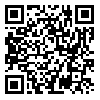BibTeX | RIS | EndNote | Medlars | ProCite | Reference Manager | RefWorks
Send citation to:
URL: http://tumj.tums.ac.ir/article-1-745-en.html

 , Fatholahzadeh B
, Fatholahzadeh B 
 , Pirali Hamedani M
, Pirali Hamedani M 
 , Noory Z *
, Noory Z * 
 , Saadati SH
, Saadati SH 
 , Zavar M
, Zavar M 
 , Pirouz B
, Pirouz B 
 , Asghari SH
, Asghari SH 
 , Khezripour M
, Khezripour M 
 , Saberi S
, Saberi S 

Background: Bacillus cereus spores distribute widely in nature and can be isolated from different kinds of foods. This bacterium can produce diarrhea and emetic enterotoxins and syndromes. As infants are known to be more susceptible to B. cereus infection due to their incomplete intestinal flora and fast growth of this bacterium during consumption, it is very important to investigate the presence of B. cereus in infant formula and possible pathogenicity of this microorganism in infants.
Methods: In this study, 60 samples of infant formula were examined for the presence of B. cereus. From a 1/10 dilution of each sample, a total amount of 1 ml was inoculated onto four phenol red agar plates containing mannitol, egg yolk emulsion and polymyxin B sulfate. The plates were incubated at 30°C for 24 hours. Confirmation tests were then performed on suspected colonies.
Results: Among the 60 samples, 11 samples had more than 10 cfu/g, four of which contained more than 102 cfu/g. The other 49 samples showed less than 10 cfu/g of B. cereus.
Conclusions: We suggest that for infant formula the maximum microbial limit be reduced to less than 10 cfu/g to control B. cereus contamination and to prevent infection in infants. For this purpose, infant formula should be tested by the method and confirmation tests used in this study. In addition, susceptibility to penicillin, ß-hemolysis and growth rate at 45ºC could also be performed.
| Rights and permissions | |
 |
This work is licensed under a Creative Commons Attribution-NonCommercial 4.0 International License. |



